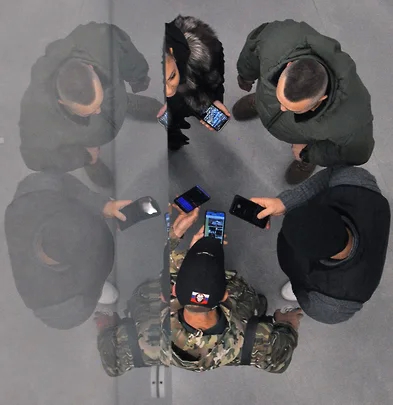The transfer of citizens to the Russian mobile OS will cost half a trillionThe implementation of the mobile ecosystem on the Aurora operating system (OS) will require 480 billion rubles by 2030, Kommersant learned.
The development project of the OS owned by Rostelecom implies the release by Russian manufacturers of about 70 million smartphones on it. This is necessary because of the threat of disconnecting the Russian Federation from Google and Apple services, Rostelecom believes. Meanwhile, market participants note that based on the project documents, it may be primarily about the contract production of smartphones in China, and not in Russia.
Kommersant got acquainted with the passport of the Aurora OS development project (owned by Rostelecom) and the creation of a national mobile ecosystem. Rostelecom sent the document to the Development Competence Center "Operating Systems", which is supervised by the Ministry of Finance.
In particular, it is said that Rostelecom offers, in partnership with Russian electronics manufacturers, to release a wide range of devices (smartphones and tablets), including consumer ones, based on the Aurora OS — a total of about 70 million units. Among the partners named are F+, GS Group, Research Institute "Scale" and others. [...]
The passport also specifies that its financing will be provided from the budget of the federal project "Digital Public Administration" (CSU) and from the national program "Digital Economy" (CE RF). The funds will be used to create and increase infrastructure, technical support of the ecosystem, purchase of devices, installation of OS and software, salaries for employees and so on. The OS development strategy, which Kommersant had previously reviewed, clarified that financing could be provided through concessions with authorities or distributors (for the public), among which telecom operators were also indicated. In the first year after the implementation of the project, the expected revenue from sales will amount to 28 billion rubles, it follows from the passport.
The document says that it is approved by the government. As explained to Kommersant by a source familiar with the mechanism of work of the Central Committee, this is an interim solution: "The passport is received by the Ministry of Finance, which sends the document to the expert working group, it makes conclusions and recommendations. Then the project is submitted for consideration by the grant committee, whose role is performed by the Russian Foundation for the Development of Information Technologies (RFRIT). His decision is sent to the legal commission for digital development." The head of the Central Committee for "Operating Systems" Alexey Smirnov confirmed to Kommersant that the working group approved the project. One of the interlocutors of Kommersant added that such a status "does not mean that the project will definitely receive funding." The Open Mobile Platform company (developer of the Aurora OS) declined to comment. The Ministry of Finance and the Ministry of Industry and Trade did not respond to Kommersant.
Now funds are going towards foreign manufacturers, and if there is a national mobile ecosystem, they can be redirected to the development of domestic ones, Rostelecom is confident.
GS Group is interested in the project and is ready to launch production. They added that they had already received a request from the Ministry of Industry and Trade about the ability to produce mobile devices. "The company has repeatedly received requests and is interested in such significant projects," says Vladislav Ivanov, head of the Scale Research Institute (part of the Automatics concern of the Roselectronics holding of Rostec Group). He recalled that the Research Institute already has a smartphone running the Aurora OS (AYYA T1), and it is planned to "expand the line".
According to the interlocutor of Kommersant, this means that "Russian smartphones" will be manufactured in China or, at best, assembled in the Russian Federation from Chinese components. The role of Rostelecom, he believes, "will be in the development and porting of the OS and installing software according to the norms of Russian legislation."
Timofey Kornev, Nikita Korolev

